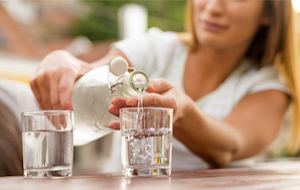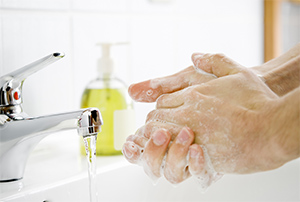What is gastroenteritis?
Acute gastroenteritis is an inflammation of the lining of the digestive system1. It may be related to a virus (in which case it is very contagious) or to a bacterial infection.1 It can be spread by:
- Direct contact between one person and another who is already infected.1
- Food contaminated1 by an infected person or contaminated water.1
- Contact with objects contaminated with fine particles from the stools of an infected person.1
Symptoms of gastroenteritis
Diarrhoea is the most common symptom of gastroenteritis –symptoms often begin suddenly.1 Diarrhoea is characterised by a change in the frequency and the consistency of stools.2 (3 to 5 watery stools in a day) The diarrhoea may be accompanied by nausea, vomiting, or abdominal pain.1
What should you do if you contract gastroenteritis ?

In the case of gastroenteritis, you should stay well-hydrated and avoid contamination of those around you.1 Gastroenteritis is generally of viral origin1 and thus does not need antibiotics.1 There are medicines available in pharmacies to reduce symptoms of the acute diarrhoea.1
Read our article on the treatment of diarrhoea
In severe, consult your doctor, who may ask for a stool sample.1
Read our article : When should I consult a doctor ?
Lastly, in order to limit the contamination of those around you, here is some practical advice:

- Wash your hands frequently (before preparing a meal, after going to the toilet or the bathroom…)1,
- Perform frequent hand hygiene, such as hand-washing, either with soap and water or using an alcohol-based hand sanitiser3,
- Use paper tissues and dispose of it immediately3,
- Refrain from touching your nose or mouth3,
- Clean the toilet preferably twice a day with disinfectant (a chlorine solution)4,5,
- Clean the places most affected in your house: doorknobs, taps, washbasins, telephones and keyboards with disinfectant such as household bleach.5
What should you eat if you have gastroenteritis?

It is important to adapt your food intake if you have gastroenteritis. This is the basis of a special diet for gastroenteritis :
- Drink more fluids than usual1; especially fluids with enough sugar and salt to compensate for the loss of salt and water in stools, (water, sweetened water, soup).2,6
- Eat meals that are lighter and more frequent, and which contain more salt and sugar.2,6
- As symptoms subside, gradually add foods to your diet.1
Gastroenteritis epidemics
In France in 2015, approximately 4,3 million people consulted a general practitioner for acute diarrhoea. Diarrhoea is a common cause of ill health. Little is known about it’s clinical and socio-environmental impact in sub-Saharan Africa.7
References
1: Boyce TG. Gastroenteritis. MSD Manual Consumer Version 2019. https://www.msdmanuals.com/home/digestive-disorders/gastroenteritis/gastroenteritis?query=gastroenteritis [Accessed 5 November 2019]
2: Greenberger NJ. Diarrhoea in Adults. MSD Manual Consumer Version. Diarrhea in Adults. https://www.msdmanuals.com/home/digestive-disorders/symptoms-of-digestive-disorders/diarrhea-in-adults?query=diarrhoea# [Accessed 5 November 2019]
3: Updated WHO recommendations for international traffic in relation to COVID-19 outbreak. 29 February. https://www.who.int/news-room/articles-detail/updated-who-recommendations-for-international-traffic-in-relation-to-covid-19-outbreak [Accessed 11 June 2020]
4: Sutjita M. Mehtar S (Ed). Guide to Infection Control in the Hospital. Chapter 27: Dairrhea. International Society for Infectious Diseases, 2018. https://isid.org/wp-content/uploads/2018/02/ISID_InfectionGuide_Chapter27.pdf [Accessed 11 June 2020].
5: Solent NHS Trust. Policy for Management of Diarrhoea nd Vomiting. https://www.solent.nhs.uk/media/1236/policy-for-management-of-diarrhoea-and-vomiting.pdf [Accessed 11 June 2020]
6: Khediri F, Mrad AI, Azzouz M, Doughi H, Najjar T, Mathiex-Fortunet H, et al. Efficacy od Diosmectite (Smecta®) in the Treatment of Acute Watery Diarrhoea in Adults: A Multicentre, Randomized, Double-Blind, Placebo-Controlled, Parallel Group Study. Gastroenterology Research and Practice 2011: Article ID 783196 1-8. doi:10.1155/2011/783196
7: Moshabela M, MacPhearson P, Ezrad N, Frean E, Mashimbye L, Elliot J et al. Clinical and social determinants of diarrhoeal disease in a rural HIV/AIDS clinic, South Africa: a case-control study. Int J STD AIDS 2012;23(5):346-350. doi:10.1258/ijsa_2011.011285.


